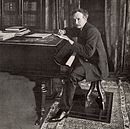Taillefer (Strauss)
| Taillefer | |
|---|---|
| Cantata by Richard Strauss | |

Strauss 1902
|
|
| Key | D major |
| Catalogue | Op. 52, TrV 207 |
| Text | Poem by Ludwig Uhland |
| Language | German |
| Composed | 26 October 1903, Heidelberg |
| Dedication | Philosophy Faculty of the University of Heidelberg |
| Scoring | Mixed choir, soloists (tenor, baritone, soprano) and large orchestra |
Taillefer is a cantata for choir and orchestra composed by Richard Strauss in 1903, Op. 52, TrV 207. The text is a rendering of the medieval tale Taillefer by the German poet Ludwig Uhland (1787–1862). The piece was written to celebrate the centenary of Heidelberg University and was premiered on the same day that Strauss received his honorary doctorate from the university, on 26 October 1903 in the newly built Heidelberg Town Hall with Strauss conducting. It is written for a mixed chorus with three soloists, tenor (Taillefer), baritone (Duke William of Normandy), and soprano (the Duke's daughter and admirer of Taillefer), with a large orchestra. The work was performed at the last night of The Proms in 2014.
Taillefer is the hero of a romantic medieval tale set in the court of Duke William of Normandy (William the Conqueror) around the time of the invasion of England and the Battle of Hastings in 1066. Strauss used the version in a poem by Ludwig Uhland written in 1816. He had previously used several of Uhlands poems for songs, including "Des Dichters Abendgang" written in 1900. Professor Philip Wolfrum, music director and choir master at Heidelberg University commissioned the work, to be premiered in the new Town Hall in Heidelberg, coinciding with the award of an honorary doctorate for Strauss and with the centenary of the reestablishment of the university as a state-owned institution. In fact, Strauss had been working on early drafts of the piece in the summer of 1902, prior to the commission (Strauss first mentions it in his notebook on 20 April, whilst in Berlin). In May he spent a short holiday in England, including a visit to the beach at Ventnor on the Isle of Wight, which further inspired him. However, Strauss realized that a large scale choral work like this would be a perfect piece for the commission and event. Most of the work was done over the period July–November 1902. The honorary doctorate was confirmed in June 1903 (while Strauss was again visiting London), and the award and premiere arranged for 26 October 1903.
...
Wikipedia
